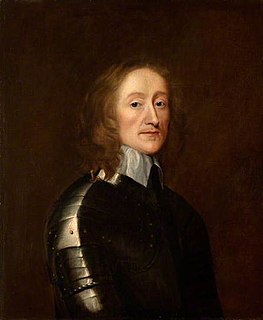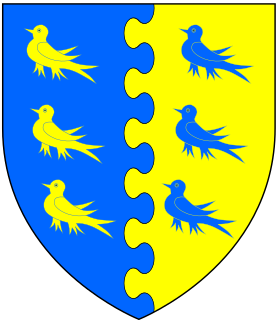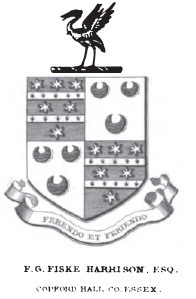Related Research Articles

The Commonwealth was the political structure during the period from 1649 to 1660 when England and Wales, later along with Ireland and Scotland, were governed as a republic after the end of the Second English Civil War and the trial and execution of Charles I. The republic's existence was declared through "An Act declaring England to be a Commonwealth", adopted by the Rump Parliament on 19 May 1649. Power in the early Commonwealth was vested primarily in the Parliament and a Council of State. During the period, fighting continued, particularly in Ireland and Scotland, between the parliamentary forces and those opposed to them, as part of what is now generally referred to as the Third English Civil War.

Major-General Thomas Harrison sided with Parliament in the English Civil War. During the Interregnum he was a leader of the Fifth Monarchists. In 1649 he signed the death warrant of Charles I and in 1660, shortly after the Restoration, he was found guilty of regicide and hanged, drawn and quartered.

Robert Devereux, 3rd Earl of Essex, KB, PC was an English Parliamentarian and soldier during the first half of the 17th century. With the start of the English Civil War in 1642 he became the first Captain-General and Chief Commander of the Parliamentarian army, also known as the Roundheads. However, he was unable and unwilling to score a decisive blow against the Royalist army of King Charles I. He was eventually overshadowed by the ascendancy of Oliver Cromwell and Thomas Fairfax and resigned his commission in 1646.

The Protectorate was the period during the Commonwealth during which England and Wales, Scotland, Ireland and the English overseas possessions were governed by a Lord Protector as a republic. The Protectorate began in 1653, when the dissolution of the Rump Parliament and then Barebone's Parliament allowed Oliver Cromwell to be appointed Lord Protector of the Commonwealth under the terms of the Instrument of Government. In 1659, the Protectorate Parliament was dissolved by the Committee of Safety as Richard Cromwell, who had succeeded his father as Lord Protector, was unable to keep control of the Parliament and the Army. That marked the end of the Protectorate and the start of a second period of rule by the Rump Parliament as the legislature and the Council of State as the executive.

George Monck, 1st Duke of Albemarle JP KG PC was a professional soldier from Devon, who fought on both sides during the Wars of the Three Kingdoms. A prominent military figure under the Commonwealth, his support was crucial to the Restoration of Charles II in 1660, who rewarded him with the title Duke of Albemarle and other senior positions.

Henry Ireton was an English general in the Parliamentarian army during the Wars of the Three Kingdoms, and the son-in-law of Oliver Cromwell. He died of disease outside Limerick in November 1651.

John Lambert, also spelt 'Lambart' was an English Parliamentarian general and politician. Widely regarded as one of the most talented soldiers of the period, he fought throughout the Wars of the Three Kingdoms, and was largely responsible for victory in the 1650 to 1651 Scottish campaign.

Sir Arthur Haselrig, 2nd Baronet was a leader of the Parliamentary opposition to Charles I and one of the Five Members whose attempted arrest sparked the 1642–1646 First English Civil War. He held various military and political posts during the 1639–1651 Wars of the Three Kingdoms but became an opponent of Oliver Cromwell during the Protectorate. In 1660, his actions inadvertently helped restore Charles II to the throne; unlike many senior Parliamentary leaders, his life was spared but he was confined to the Tower of London, where he died on 7 January 1661.

The Rump Parliament was the English Parliament after Colonel Thomas Pride purged the Long Parliament, on 6 December 1648, of those members hostile to the Grandees' intention to try King Charles I for high treason.

Sir William Waller was an English soldier and politician, who commanded Parliamentarian armies during the First English Civil War, before relinquishing his commission under the 1645 Self-denying Ordinance.

The Wars of the Three Kingdoms, sometimes known as the British Civil Wars, were an intertwined series of conflicts that took place between 1639 and 1653 in the Kingdoms of England, Scotland and Ireland – separate kingdoms which had the same king, Charles I. The wars were fought mainly over issues of governance and religion, and included rebellions, civil wars and invasions. The English Civil War has become the best-known of these conflicts. It ended with the English parliamentarian army defeating all other belligerents, the execution of the King, the abolition of the monarchy, and the founding of the Commonwealth of England; a unitary republic which controlled the British Isles until 1660.

Colonel Robert Lilburne (1613–1665) was the older brother of John Lilburne, the well known Leveller. Unlike his brother, who severed his relationship with Oliver Cromwell, Robert Lilburne remained in the army. He is also classed as a regicide for having been a signatory to the death warrant of King Charles I in 1649. He was forty-seventh of the fifty nine Commissioners.

The Interregnum was the period between the execution of Charles I on 30 January 1649 and the arrival of his son Charles II in London on 29 May 1660 which marked the start of the Restoration. During the Interregnum, England was under various forms of republican government.

Colonel John Okey was a political and religious radical who served in the Parliamentarian army during the Wars of the Three Kingdoms. A regicide who approved the Execution of Charles I in 1649, he escaped to the Dutch Republic after the 1660 Stuart Restoration, but was brought back to England and executed on 19 April 1662.
William Packer was a major-general during the English Civil War.
The Rule of the Major-Generals, was a period of direct military government from August 1655 to January 1657, during Oliver Cromwell's Protectorate. England and Wales were divided into eleven regions, each governed by a major-general who answered to the Lord Protector.

Charles Fleetwood was an English Parliamentarian soldier and politician, Lord Deputy of Ireland in 1652–1655, where he enforced the Cromwellian Settlement. Named Cromwell's Lieutenant General for the Third English Civil War, Fleetwood was thereafter one of his most loyal supporters throughout the Protectorate. After the Lord Protector's death, Fleetwood was initially supportive of his brother-in-law Richard Cromwell, but turned against him and forced him from power. Together with his colleague John Lambert he dominated government for a little over a year before being outmaneuvered by George Monck. At the Restoration he was included in the Act of Indemnity as among the twenty liable to penalties other than capital, and was finally incapacitated from holding any office of trust. His public career then closed.

George Fleetwood (1623–1672) was an English major-general and one of the regicides of King Charles I of England.

Fiske Goodeve Fiske-Harrison of Copford Hall, Lord of the Manor of Copford was High Sheriff of Essex.
John King, 1st Baron Kingston was an Anglo-Irish soldier during the Wars of the Three Kingdoms who served the Commonwealth government during the Interregnum and government of Charles II after the Restoration.
References
- Durston, Christopher. "Haynes, Hezekiah (d. 1693)", Oxford Dictionary of National Biography, Oxford University Press, Sept 2004; online edn, Jan 2008 Retrieved 26 Nov 2009
- Plant, David. Hezekiah Haynes, Major-General, d.1693, the British Civil Wars and Commonwealth website
- Royal, Trevor; Civil War: The Wars of the Three Kingdoms 1638-1660; Pub Abacus 2006; (first published 2004); ISBN 978-0-349-11564-1